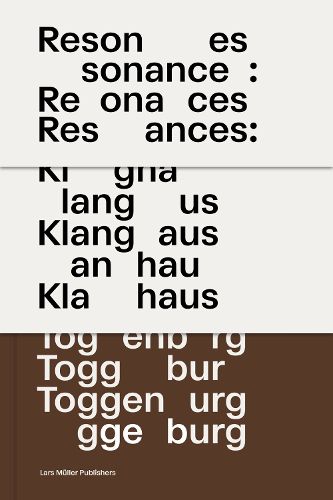Readings Newsletter
Become a Readings Member to make your shopping experience even easier.
Sign in or sign up for free!
You’re not far away from qualifying for FREE standard shipping within Australia
You’ve qualified for FREE standard shipping within Australia
The cart is loading…






Nestled in the Swiss Canton of St. Gallen, this ?walk-in musical instrument? 20 years in the making is designed to consider the mingling acoustics of music and the alpine landscape. The Klanghaus Toggenburg, located in the northeast of Switzerland and host to musical rehearsals, courses and concerts alike, is a place that enables visitors to experience a unique interplay of architecture, sound and nature. The Klanghaus in the Swiss Canton St. Gallen is the result of an impressive twenty-year development process: based on a concept by the late Marcel Meili, which won the 2010 thesis competition for the building, it was then realized by architect Astrid Staufer with the office Staufer & Hasler and opens its doors to the public in May of 2025. It is, at its core, a fundamentally social project, comprised of the work of all those involved in this process. Like the building itself, this publication is best understood as a research experiment intended to reveal new insights into sound and space. The book focuses on architectural aspects and constructive solutions for extraordinary room acoustics, as well as the interactions between the alpine landscape and natural yodeling or between the soundscape and the construction of the Klanghaus. It explores the many aspects of an extraordinary building, from the material vitality of shingles to the impressive conceptual proximity to the Ali Qapu Palace in Isfahan to the way ornaments become a visible expression of the essence of space and architecture itself. Combining various contributions from experienced and upcoming experts from fields as diverse as architecture, sound art, acoustics timber construction, ethnomusicology, art history, philosophy, history and tourism, this publication creates a polyphonic image. These texts are complemented by 3D architectural and construction drawings, photo series, musical scores and lyrical fragments. 120 illustrations
$9.00 standard shipping within Australia
FREE standard shipping within Australia for orders over $100.00
Express & International shipping calculated at checkout
Nestled in the Swiss Canton of St. Gallen, this ?walk-in musical instrument? 20 years in the making is designed to consider the mingling acoustics of music and the alpine landscape. The Klanghaus Toggenburg, located in the northeast of Switzerland and host to musical rehearsals, courses and concerts alike, is a place that enables visitors to experience a unique interplay of architecture, sound and nature. The Klanghaus in the Swiss Canton St. Gallen is the result of an impressive twenty-year development process: based on a concept by the late Marcel Meili, which won the 2010 thesis competition for the building, it was then realized by architect Astrid Staufer with the office Staufer & Hasler and opens its doors to the public in May of 2025. It is, at its core, a fundamentally social project, comprised of the work of all those involved in this process. Like the building itself, this publication is best understood as a research experiment intended to reveal new insights into sound and space. The book focuses on architectural aspects and constructive solutions for extraordinary room acoustics, as well as the interactions between the alpine landscape and natural yodeling or between the soundscape and the construction of the Klanghaus. It explores the many aspects of an extraordinary building, from the material vitality of shingles to the impressive conceptual proximity to the Ali Qapu Palace in Isfahan to the way ornaments become a visible expression of the essence of space and architecture itself. Combining various contributions from experienced and upcoming experts from fields as diverse as architecture, sound art, acoustics timber construction, ethnomusicology, art history, philosophy, history and tourism, this publication creates a polyphonic image. These texts are complemented by 3D architectural and construction drawings, photo series, musical scores and lyrical fragments. 120 illustrations